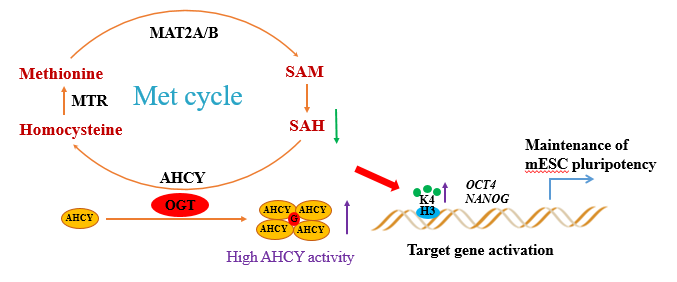Title: O-GlcNAcylation regulates the methionine cycle to promote pluripotency of stem cells
Qiang Zhu, Xuejun Cheng, Yaxian Cheng, Junchen Chen, Huan Xu, Yuntao Gao, Xiaotao Duan, Junfeng Ji, Xuekun Li, and Wen Yi
PNAS first published March 19, 2020 https://doi.org/10.1073/pnas.1915582117
Abstract
Methionine metabolism is critical for the maintenance of embryonic stem cells (ESCs) and induced pluripotent stem cells (iPSCs) pluripotency. However, little is known about the regulation of the methionine cycle to sustain ESC pluripotency. Here, we show that adenosylhomocysteinase (AHCY), an important enzyme in the methionine cycle, is critical for the maintenance and differentiation of mouse embryonic stem cells (mESCs). We show that mESCs exhibit high levels of methionine metabolism, whereas decreasing methionine metabolism via depletion of AHCY promotes mESCs to differentiate into the three germ layers. AHCY is posttranslationally modified with an O-linked β-N-acetylglucosamine sugar (O-GlcNAcylation), which is rapidly removed upon differentiation. O-GlcNAcylation of threonine 136 on AHCY increases its activity and is important for the maintenance of trimethylation of histone H3 lysine 4 (H3K4me3) to sustain mESC pluripotency. Blocking glycosylation of AHCY decreases the ratio of S-adenosylmethionine versus S-adenosylhomocysteine (SAM/SAH), reduces the level of H3K4me3, and poises mESC for differentiation. In addition, blocking glycosylation of AHCY reduces somatic cell reprogramming. Thus, our findings reveal a critical role of AHCY and a mechanistic understanding of O-glycosylation in regulating ESC pluripotency and differentiation.
Link: https://www.pnas.org/content/early/2020/03/18/1915582117






